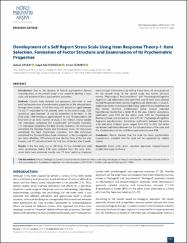Development of a Self Report Stress Scale Using Item Response Theory-I: Item Selection, Formation of Factor Structure and Examination of Its Psychometric Properties
Künye
TATAR, Arkun, Gaye SALTUKOĞLU & Ercan ÖZMEN. "Development of a Self Report Stress Scale Using Item Response Theory-I: Item Selection, Formation of Factor Structure and Examination of Its Psychometric Properties". Archives of Neuropsychiatry, 55 (2018): 161-170.Özet
Introduction: Due to the absence of Turkish psychometric devices
assessing stress, in the present study it was aimed to develop a stress
scale, and examine its basic psychometric properties.
Methods: Current study included two processes, formation of item
pool and examination of psychometric properties of the selected items
through three studies. In the first study, 611 individuals aged between
18 and 77 responded to 130 selected items. In the second study, 2223
individuals aged between 18 and 68 responded to 80 items. In the
third study, 1969 individuals aged between 18 and 79 responded to the
final form of 36 items. Further, in study 3 for criterion related validity
163 individuals completed the Coopersmith Self-Esteem Inventory,
113 individuals completed the Beck Anxiety Inventory, 104 individuals
completed the Hospital Anxiety and Depression Scale, 107 individuals
completed the Beck Depression Inventory, and 265 individuals
completed the Perceived Stress Scale. Moreover, in the investigation of
test-retest reliability, 119 individuals took the final form of the test after
2 weeks, and 111 individuals took the final form of the test after 3 weeks.
Results: In the first study, out of 130 items, 54 that showed item-total
score correlations below 0.30 were excluded from the scale. Fiftyseven
items were preserved exactly, and 19 items’ sentence structures
were changed. Furthermore, by adding 4 new items, 80 were prepared
for the second study. In the second study, two factors structure
namely “Physiological Reactions/Strain” and “Psychological/Cognitive
Appraisals” sub-dimensions were identified, and 36 items were selected
via Item Response Theory representing these sub-dimensions. In study 3,
exploratory factor analysis provided strong support for our hypothesized
two factors structure. Confirmatory factor analysis indicated
hypothesized model had a better fit to the data. Internal consistency
coefficients were 0.94 for the entire scale, 0.90 for Physiological
Reactions/Strain sub-dimension, and 0.91 for Psychological/Cognitive
Appraisals sub-dimension. Correlation coefficients between the entire
scale and other criterion scales ranged from 0.22 to 0.63. Test-retest
correlation coefficients between the first administration of the scale, and
the administrations at two and three week intervals were 0.88.
Conclusion: Results showed that the scale has basic psychometric
requirements provided that the scale will be supported by validity
studies.
Kaynak
Archives of NeuropsychiatrySayı
55Bağlantı
https://www.noropsikiyatriarsivi.com/sayilar/c55s2/en/npa_v55n2_161-170.pdfhttps://hdl.handle.net/11352/3666



















